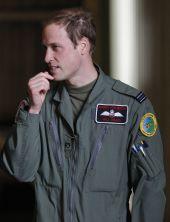 | « Back to article | Print this article |
 Prince William's role as a RAF Sea King pilot may end as Britain's search-and-rescue helicopter service which he is part of will be taken over by a US firm after privatisation.
Prince William's role as a RAF Sea King pilot may end as Britain's search-and-rescue helicopter service which he is part of will be taken over by a US firm after privatisation.
The 1.6 billion pounds deal with US-headquartered Bristow Helicopters ends 70 years of a service run by the RAF and Royal Navy squadrons and spells the end of the use of Sea King helicopters in search-and-rescue work.
Prince William, 30, a flight lieutenant based at RAFValley on Anglesey, is understood to have voiced concern over privatisation plans when he met Prime Minister David Cameron.
The future Commander-in-Chief of the Armed Forces joined C Flight, 22 Squadron at RAFValley in September 2010.
He qualified as an operational search and rescue captain last year and now has a full-time job, albeit with time off for royal appearances, rescuing stranded climbers and stricken vessels on emergency missions in Sea King helicopters.
The RAF said it would stop its search and rescue work from March 2016.
A spokesman said employees will then be faced with a number of possibilities which include ground-based roles and airborne roles, both in the UK and overseas.
They will also have the option to apply to leave the RAF.
Under the new contract, 22 state-of-the-art helicopters will operate from 10 locations around the UK.
Ten Sikorsky S92s will be situated, two per site, at Stornoway and Sumburgh in Scotland, and at new bases at airports in Newquay in Cornwall, Caernarfon in Wales, which will take over operations previously covered by Prince William's base, and Humberside.
Ten AgustaWestland AW189s will operate, two per site, from Lee on Solent and a new hangar at PrestwickAirport, and new bases which will be established at St Athan, Inverness and Manston airports.
All bases will be operational 24 hours a day.
Photograph: Reuters